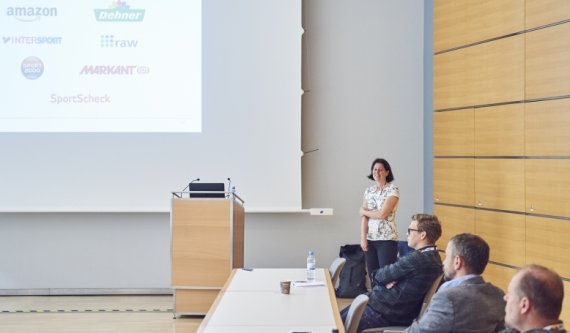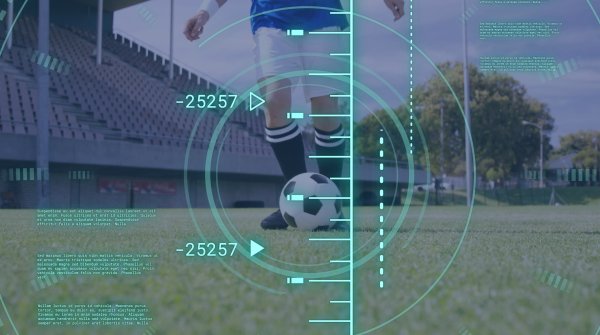
In times of digitalization, data is the be-all and end-all for a company's success in the sports industry as well. Nevertheless, the confusion of different formats is just as great in the industry as the costs for conversion.
"After all, there are even bigger brands that still work with paper. But principles like never out of stock (NOS) simply only work if the data quality is right. So a few of us came up with the idea of sharing the cost of data conversion and setting up a common interface for data exchange," says Nicole Espey.
She is the managing director of the Federal Association of the German Sporting Goods Industry (BSI), under whose umbrella the so-called "BSI Sport Clearing Center" was established. The fact that the data interface was set up here has several advantages: On the one hand, the association with members from both industry and trade is impartial for both sides, and on the other hand, as a registered association, it only has to cover its costs.
This saves money for all participants. The flat rate costs 7000 euros per year for BSI members and 8000 euros for non-members - including an unlimited amount of data exchange with an unlimited number of trading partners. No transaction or volume fees are charged. For trading partners, participation is free of charge.
Dealers (and manufacturers) only have to pay for the mapping of their own in-house format into the BSI format and the software package for the secure connection to the BSI Sport Clearing Center. At around 5,000 euros per year, however, this is also relatively inexpensive. On the retailer side, Intersport, Sport2000, Sport Scheck, Markant, Dehner and RAW are all on board.
"We are in the process of approaching many smaller retailers and connecting them on request," reports Espey. Of the manufacturers, Adidas, Fashy, Fibertec, Joola, Lowa, Marmot, Nordisk, Ortlieb, OSC, Scippis, Tatanka and Zangenberg trust the new interface so far. "Of course, the more that join in, the cheaper it could get for everyone in perspective," Espey promises.
In addition to the cost savings from jointly financing the EDI software converter, the other benefits are obvious: data quality is improved, the overview of goods availability increases, and thus production and warehouse planning can be raised to a new level.
By reporting sales figures and subsequent deliveries of new goods, retailers can effectively manage NOS systems. In the future, BSI even hopes that the exchange of data, including trend analyses, will enable collections to be developed more in line with market requirements.
The participants in the BSI Sport Clearing Center have agreed on EDIFACT format as a uniform standard because, as things stand, it best reflects the requirements of the trade. However, this may also change in the future; many smaller retailers are relying on XML, for example, for reasons of cost and comprehension.
"We are constantly developing the data exchange, of course. And the members decide together what is best for everyone," says Espey. In general, there are no limits to optimizing the value chain in the sports industry through better data exchange, he adds.
"Warehouses and logistics providers could also be integrated in the future," hopes Bastian Tielmann, EDI specialist at BSI. He points out that by 2020, only electronic invoices will be accepted by all government agencies such as the federal, state and local governments. Therefore, the data exchange of invoices in PDF format could also be handled via the BSI Clearing Center in the future.
The aim is to use the data exchange to actually make the digitization of the supply chain in the sports industry - where there are still retailers who fax or phone through their orders - a reality.
Aside from the cost savings through joint financing of the EDI software converter, the other benefits are obvious: The data quality is improved, the overview of the availability of goods increases, and thus production and warehouse planning can be taken to a whole new level.
By reporting sales figures and the resulting deliveries of new goods, retailers can effectively manage NOS systems. In the future, the BSI even hopes that data exchange and trend analyses will enable collections to be developed in line with the market.
The participants in the BSI Sport Clearing Center have agreed on the EDIFACT format as the uniform standard, as it best depicts retail requirements as they stand. Nevertheless, that can change in the future. Many smaller retailers rely on XML for cost and comprehension reasons, for example.
“Naturally, we will be constantly further developing the data exchange. And the members will decide together what’s best for everyone,” says Espey. In general, there are no limits to the optimization of the value chain in the sports industry through better data exchange.
“Warehouses and logistics specialists could also be integrated in the future,” hopes Bastian Tielmann, EDI specialist at the BSI. He points out that, in 2020, only electronic invoices will be accepted by all government agencies such as the German federal government, the federal states, and local authorities. For that reason, the exchange of data for invoices in PDF format could likewise be processed via the BSI Clearing Center in the future.
The aim of data exchange is to make the digitalization of the supply chain in the sports industry – where there are still retailers who fax or telephone in their orders – a reality.
 SportsTechUnlocking the Future of Sports with AI
SportsTechUnlocking the Future of Sports with AI
- ISPO awards
- Mountain sports
- Bike
- Design
- Retail
- Fitness
- Health
- ISPO Job Market
- ISPO Munich
- ISPO Shanghai
- Running
- Brands
- Sustainability
- Olympia
- OutDoor
- Promotion
- Sports Business
- ISPO Textrends
- Triathlon
- Water sports
- Winter sports
- eSports
- SportsTech
- OutDoor by ISPO
- Heroes
- Transformation
- Sport Fashion
- Urban Culture
- Challenges of a CEO
- Trade fairs
- Sports
- Find the Balance
- Product reviews
- Newsletter Exclusive Area
- Magazine



